The role of patriotism in a democracy
June 1, 2005
Fred Hutchison
RenewAmerica analyst
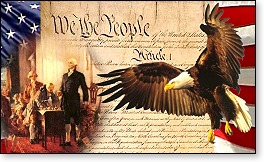
The patriotism campaign
During the election primaries of 2004, the Democrats chose John Kerry, a war hero, rather than Howard Dean, an anti-war rabble rouser. Even though Dean captured the hearts of the liberal activists, they chose Kerry on pragmatic grounds. They feared a Dean candidacy would be a repeat of the election disasters of McGovern, Mondale, and Dukakis, who were all perceived as weak on national defense and uninspiring on patriotism.
After the terror attack on the World Trade Center in New York, there was a great welling up of American patriotic feeling. This set the stage for a collision between those swept up in the new mood of patriotism and those seduced by the anti-American and anti-military siren song coming from the left.
When America went to war against Afghanistan and Iraq, there was a lot of opposition from liberal Democrats and from leftist demonstrators on the street. The demonstrators were stridently anti-American in their signs and slogans, which offended many patriotic Americans. Liberals in Congress and in the press subjected the president to hectoring criticism of a negative kind about the war. What is worse, they amplified every military problem and reviewed the war in a defeatist vein.
The strident antiwar rants of Dean were disconcertingly popular with Democrats for a few months during the primaries. The patriotism problem was compounded when Democratic leaders stood up and cheered in Michael Moore's anti-American propaganda film, Fahrenheit 911. Annoyed Republicans began to wonder about the patriotism of the liberal Democrats because they seemed to be undermining the soldiers in the field and giving comfort to America's enemies in a time of war.
Hillary Clinton noticed this gathering political problem for Democrats and gave her famous "Don't you dare question our patriotism" speech. Democrats knew that they were vulnerable during the general direction on the issues of national defense
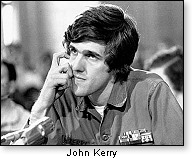
The first half of the election campaign was bogged down with a debate among the men who served under Kerry about the quality of his leadership. The debate spread to Kerry's leadership of a radical anti-war movement after he returned home from Vietnam, and Kerry's anti-military votes as a Senator.
This kind of brouhaha about patriotism and commitment to national defense alienated many moderate voters against the Democrats. Many liberals are embittered because they feel their patriotism was impugned. Conservatives are left confused about why some people whose words and deeds are consistently anti-American insist on styling themselves as patriots. Can history shed light on these conundrums?
Democracy, patriotism, and war
Small republics and large democracies are naturally vulnerable to military threats from totalitarian powers. Democracies do not usually have large standing professional armies as do totalitarian regimes. Democracies rely upon an a large number of volunteer citizen soldiers who are motivated to serve their country by patriotism. Without patriotism, a democracy like America is not likely to survive. Therefore, patriotism is of necessity a staple of American elections. Partisan competition to prove that "our patriotism is better than your patriotism" is inevitable.
Carl Von Clausewitz (1780-1831) said in his military classic, On War, that aristocratic armies who fight democratic armies have the advantage during short wars because the aristocratic armies are trained professionals who are their best in the early days of a war but get gradually weaker afterwards. Democratic armies have the advantage in long wars because a democratic army is at its weakest at the beginning of the war and grows gradually stronger thereafter. National patriotism
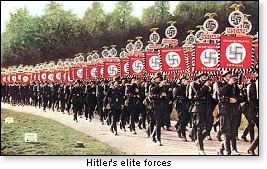
During the first two years of the American Civil War, the aristocratic army of the Southern Confederacy had a string of victories in the eastern theater of war over the democratic army of the Union. During the last two years of the war, the Union army won a majority of the major battles. At the end of the war, the Union army was at peak strength, but the Confederate army was ragged, hungry, and stranded from its supply lines.
A democratic army can eventually recruit more volunteers from the call of patriotism than an aristocratic army can conscript, but the aristocratic army can raise and train an army more quickly. Democracies require time to mobilize their economy for war and convert their drowsy, bureaucratic, politically-compromised peacetime army into battalions of real fighting men with good leaders.
During a time of war, the people of a democracy can learn and grow and adapt in ways that the brittle top-down structure of authoritarian state cannot do as easily. In time, the citizen soldier can learn and mature as a warrior and become more effective than a professionally-trained soldier. The citizen soldier can master the skills of war given enough time, and is more flexible in adapting to new ways of fighting.
The professional soldier is trained to fight the last war and must unlearn some of the old ideas in a new war.
Once citizen soldiers become proficient in battle, their patriotic ideals give their units espirit de corps and give the men strength to endure the rigors of war. In the long run, it is the fervent patriotism of a free people during war that counts. A foreign enemy of a democracy in a long war eventually finds himself fighting an entire people who are united and have great enthusiasm for their cause.
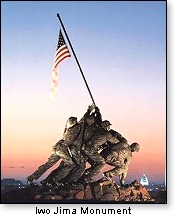
A short history of patriotism
Providentially, by the time large democracies appeared on the scene, a new kind of national patriotism had developed. If it had not worked out in this manner, the new democracies could not have survived. But this new kind of patriotism is an exotic novelty in the history of the world. Let us consider how history gradually brought us to our present situation.
Local patriotism
C.S. Lewis said that men naturally develop affection for the village or the countryside where they live. When Joshua allotted Canaan to the Israelites, each family was given a particular piece of land to possess forever. Moses decreed a variety of statutes to enable a family to hold onto the land or regain the land they had lost. For example, if a man died, his brother was obligated to marry his brother's widow to keep the land in the family. When a family lives on the same piece of land from generation to generation, a very powerful love of the land develops.
"Thou shalt arise and have mercy upon Zion, yea for the time to favor her, yea, the set time has come. For thy servants take pleasure in her stones, and favor the dust therof." (Psalm 102:13)
"By the rivers of Babylon, there we sat down, yea, we wept, when we remembered Zion. We hung our harps upon the willows in the midst thereof. For they that carried us captive required of us a song: and they that wasted us required of us mirth, saying, Sing us one of the songs of Zion. How shall we sing the Lord's song in a strange land? If I forget thee, O Jerusalem, let my right hand forget her cunning. If I do not remember thee let my tongue cleave to the roof of my mouth, if I prefer not Jerusalem above my chief joy. (Psalm 137: 1-6)
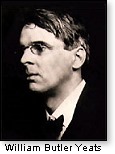
"I know that I shall meet my fate / Somewhere among the clouds above; / Those I fight I do not hate, / Those I guard I do not love: / My country is Kiltartan Cross, / My countrymen Kiltartan's poor, / No likely end could bring them loss / Or leave them happier than before." (Exerpt, An Irish Airman Forsees His Death)
This Irish lad who cared only for his own small village and was indifferent to the wider world was not a strange exotic being. This is how most people have felt for the bulk of history.
Blood and soil
German Romanticism of the eighteenth century produced a new patriotism that extended beyond a village to a folk region. Prior to the unification of Germany under Bismark in the nineteenth century, the country consisted of dozens of small states. Imaginative Romantic poets were able see a link between a folk region and a small provincial state. Thus, the people of Bavaria were patriotic about Bavaria, the people of Saxony were patriotic about Saxony, and so forth.
The Romantics believed that a people group are a product of blood and soil and the cultural history of their people on the land of their birth. They rejected the idea that man has a nature that is universal to all mankind. The nature of one folk group was held to be essentially different from the nature of another folk group. They believed that a mystical spiritual force wells up from the land where they and their ancestors lived, creating their identity and culture. Thus, the term "blood and soil" was coined for this kind of feeling. "Remember Katie Scarlett, the land is the only thing that lasts. This love of the land will come to you." (Paraphrased excerpts from Gone With the Wind.) In the postwar ruins of her plantation, Scarlett held up the dirt of Tara when she vowed never to be hungry again. Scarlett periodically returned to Tara because it was "the source of her strength."
Scarlett's love of the land is the "soil" part of "blood and soil" patriotism. "Nativism" is the "blood" or racial side of the equation. The Romantics believed that "blood" ties are something more than kinfolk. The folk group that lives on the land in one's region has mystical ties of "blood." Over centuries of living together on the land, it was believed, a spirit emanates from the land to create a folk group who share a common culture and regard each other almost like kin.
Nativism can produce a powerful provincial patriotism, but it has two fatal weaknesses. Nativism tends to be an ineffective kind of patriotism for a large, diverse cosmopolitan nation. Special devices of propaganda are needed to extend nativism to a nation. Nativism is fatally prone to racism and hatred of other ethnic groups. The tiny ethnic nations of the Balkans hate each other so passionately with ancient hatreds that the Western powers must periodically intervene to prevent genocide.
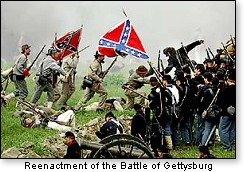
Interestingly, it was slavery that made it possible for Southern nativism to be applied to a regionally diverse confederation of eleven states. Without slavery, a man of Virginia would feel no blood and soil kinship with a man from Texas. However, if both states have slavery, a nativist racial affinity between Virginians and Texans seemed apparent when they compared themselves to their black slaves.
The political struggles of the decades before the Civil War focused on whether new western states would be slave or free. The Democratic party had a majority in Congress by uniting a solid south together over the highly inflamed issue of western slavery. The feeling of nativistic kinship was spreading beyond state patriotism and slowly becoming a southern patriotism. When war broke out, the fever of Southern nativist patriotism spread like wild fire.
We are a band of brothers / And native to the soil / Fighting for our liberty / With treasure, blood and toil. / And when our rights were threatened / The cry rose near and far / Hurrah for the Bonny Blue flag / That bears a single star. (First verse, The Bonny Blue Flag, by Harry McCarthy)
This song about the "band of brothers," who are "native to the soil" mentions all eleven states of the Confederacy. When Mississippi seceded from the union, they raised a blue secession flag with one star above the statehouse. The sight inspired Harry McCarthy to write the song.
The patriotism of union soldiers was a dedication to abstract ideals, not to blood and soil nativism. The blood and soil patriotism of the south was more quickly inflamed than was union patriotism of abstract ideals. The quickly flaming patriotic nativist passions of the rebels gave them an edge during the first year of the war. They rushed into battle passionately screaming in joy and rage the famous rebel yell. The cooler, more patient Union troops did not scream.
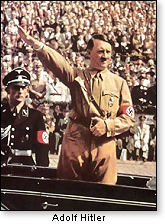
This did not happen spontaneously. It required a tremendous propaganda effort and all the resources of a totalitarian state to bring it about. Once Hitler had united Germany in blood and soil nativism, the next step was to convince them of their racial supremacy. Racist theory had been developed during the Victorian era and was popular among the German middle classes. All Hitler had to do was revive and rerun this old material. Once the German people were convinced of their racial supremacy, it was not difficult to persuade them that their destiny was to conquer and rule the lesser breeds.
Blood and soil nativism is mischievous and divisive in a democracy. The Jim Crow color line bred local bitterness and undercut national unity. Those who hate racism and believe that all patriotism is nativism in disguise will tend to become anti-patriotic. Some modern liberals may have fallen into this misconception. As we shall see, there is another higher kind of patriotism that works against racism.
Napoleonic patriotism
Napoleon Bonaparte was the first leader of a large nation to recruit a large volunteer army of citizen soldiers based upon the appeal of patriotism. With this army, he conquered Spain and parts of Italy and Germany, and twice faced the allied of armies of England, Austria, and Prussia. He was able to consistently prevail against this alliance by maneuvering to defeat these armies one at a time. He was defeated at Waterloo because the Prussians arrived just in time to save the English.
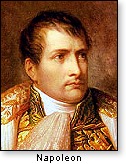
"For mighty were the auxiliars which then stood/ Upon our side, we who were strong to love! / Bliss was it in that dawn to be alive, / But to be young was very heaven." William Wordsworth
France was simultaneously in a revolution and at war. The extraordinary passion described by Wordsworth, a young Englishman visiting France, was a combination of four kinds of patriotism. There was patriotism to the revolution, patriotism to France against her enemies, French nativism, and loyalty to Napoleon, a romantic figure:
Alons enfants de la patrie, (Hearken, children of the fatherland,) Le jour de gloire est arrive. (The day of glory has arrived) Contre vous de la tyrannie (Against you is the tyranny), l'etandard sanglant est leve. (The bloody banners are risen.) Entendez vous dans les campagnes? (Are you listening in the country?) Mugir ces feroces soldats (...? those ferocious soldiers.) Ils viennent jus'que dans nos bras (They come into our arms) Egorger nos fils, nos campagnes (To swallow up our sons and countrymen) Aux armies citoyens (To armies, citizens) Formez vos battaillons (Form your battalions) Marchons, marchons, quand sang impur (March with the inpure blood, i.e. the common man). Ils breuvent nos sillions. (They plow our furrows, an archaic idiomatic untranslatable French expression.) (La Marseillaise, Ruget de lisle,1792. Sung with vigor by a patriotic militia unit as they marched from Marseilles to Paris.)
This is one of the most rousing patriotic songs ever written and it is a masterpiece of romantic blood and soil patriotism. Napoleon, a Corsican, convinced the French that he was the natural leader of the nativist French. He also convinced them that he embodied the spirit of the revolution. He also posed as the savior of France. "Against you is the tyranny," i.e., the foreign enemies that were monarchies.
The motto of the revolution was "Liberty, Equality, and Fraternity." These are large, abstract, and airy concepts. They are based upon the concept that human nature is universal, all men have natural rights, and that a nation that abolishes tyranny enjoys a natural brotherhood of man. As the men followed Napoleon in patriotic rapture, they believed these abstract ideals.
Historically, French-style patriotism split in two. The leftists in Europe adopted patriotism to the revolution
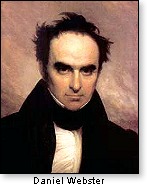
During the early decades of the nineteenth century, Southern states quarreled bitterly over tariffs that protected New England industries but raised prices for the agrarian south. Vice President John C. Calhoun of South Carolina argued that a state could nullify a tariff bill, and in last resort, secede from the union. In response, Daniel Webster, Senator from Massachusetts, gave a famous speech with the line, "Liberty and union, now and forever, one and inseparable." This ideal inspired Abraham Lincoln to devote his life to save the union from secession. The ideal of the union gradually merged with the abstract, airy ideals that Thomas Jefferson wrote into the Declaration of Independence. "We hold these truths to be self-evident, that all men are created equal, that they are endowed by their Creator with certain unalienable rights, that among these are life, liberty and the pursuit of happiness."
These rights are for all men everywhere. However, the ideal of the union made these rights sacred to Americans. It is not that Americans think the rights are exclusive to themselves. Americans have always been eager for others to enjoy them, but have never urged a utopian world revolution as the Marxists have done. Americans believe that any threat to the union is a threat to the sacred ideals of American freedom. Hence utopian idealism, which places internationalism above the union, is a threat to freedom. If the union is strong, it can protect itself against hostile foreign threats and thereby preserve the liberty of Americans.
The American left does not agree. They prefer the ideals of internationalism over nationalism and suspect American patriotism of being parochial and secretly nativist, if not racist. Quite to the contrary, the ideals of the union work against parochialism and nativism, as the Civil War decisively proved. American national patriotism combines love of country and belief in the universality of human nature. At the same time, people of the various states may cultivate a natural love of home and hearth, which C.S. Lewis and William Butler Yeats wrote about.
Patriotism is a mysterious spiritual sort of thing. It burns in the chest in a way that is remarkably similar to the love of God and the love of Truth.
"Breathes there a man with soul so dead / Who never to himself has said, / This is my own, my native land? / Whose soul has ne'er within him burned / When home his footsteps he has turned / From wandering on a foreign strand?" (From The Lay of the Last Minstrel, by Sir Walter Scott)
RenewAmerica analyst Fred Hutchison also writes a column for RenewAmerica.
© 2005 Fred Hutchison
|
|

